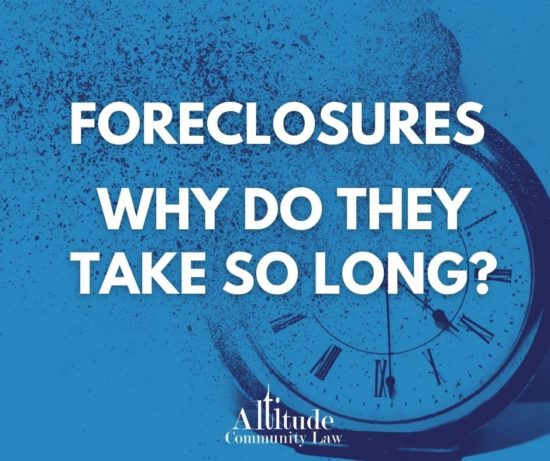
Foreclosure is generally a last resort to collect delinquent balances, and boards understandably have many questions about the process. The purpose of this article is to explain and answer questions about why foreclosures take a long time to complete.
To understand why foreclosures take so long to complete, you first need to know the basic procedures for judicial foreclosures.
Foreclosures are best explained as a four-step process:
- During the pre-foreclosure phase, we review the file to spot potential issues, ensure the required notice(s) were sent to the owner, verify the balance meets minimum requirements, review liens on the property and evaluate the potential equity.
- Following the Board’s vote to proceed with foreclosure, the steps in a judicial foreclosure include filing the lawsuit, serving all interested parties (including owners, lenders, judgment holders, etc.) with the summons and complaint, and obtaining the judgment and order and decree for foreclosure from the court.
- Once judgment and the order and decree of foreclosure are issued, the following steps are providing all of the paperwork to the sheriff and having the sale.
- Finally, the most crucial step to the Board is waiting for the redemption period to expire and collecting the funds from the sale.
Each of the preceding steps has its own set of integral steps that get us from Point A (lawsuit) to B (judgment) to C (sale) and D (payment). Without enumerating the individual steps, the initial process of filing to judgment – in an uncontested case – can occasionally be accomplished in as little as three months; a more typical timeline is four to six months, with that time being dependent on the number of defendants, the difficulty of service, working out stipulations with the lender and junior lienholders and on how long it takes the court to issue orders. The process may also take additional time if the owner(s) try to negotiate a payment plan or settlement.
Once the court issues a judgment and order permitting a sale, a set of documents are prepared for the sheriff. In some counties, the sheriff requires a certified copy of the order; in others, it is necessary to issue a bond before the sheriff schedules a sale. The sheriff also has requirements established by statute for proceeding with a sale. These requirements include mailing notices to interested parties and publishing a notice of the sale for five weeks in a local newspaper. Most counties also post a copy of the notice on the property. All told, the sale date is generally four months from the date the sheriff receives the document package from the attorney.
The final phase of foreclosure, the actual sale, the statutory redemption period, and payment to the Association (finally!) take the least amount of time. Several days before the sale, a bid is submitted to the sheriff stating the amount owed to the Association and is the initial bid on the property. On the day of the sale, the sheriff starts with the Association’s bid and accepts bids until there are no more bids. The highest bidder receives a certificate of purchase (“COP”). Junior lienholders have the ability to take ownership from the COP holder by reimbursing the COP holder and paying nominal interest but must act within eight (8) days of the sale or lose the right. Next, the sheriff will set the dates for the redemption period, which will not be less than nineteen (19) days. Once the redemption period is out of the way, the next step is to request funds. Some sheriff’s offices will simply cut a check, but others require a motion to be filed with the court. In those cases, funds will not be disbursed until the court issues an order directing the court clerk to remit payment.
Although there are exceptions, of course, most judicial foreclosure cases are not overly complex, just detail-oriented and time-consuming. But the end result – receiving payment in full and having new owners that will timely pay assessments – is worth the wait. For a more detailed discussion of foreclosure, see Nuts and Bolts of Foreclosure.
For additional information on the foreclosure process, please feel free to contact any of our Altitude attorneys at 303-432-9999 or [email protected].